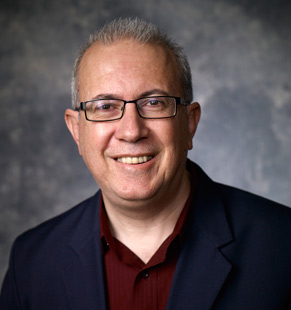Dr. Philipos Loizou
- Former Professor of Electrical Engineering
- Cecil H. and Ida Green Professor in Systems Biology Science (Former)

The legacy of Cecil H. and Ida Green at The University of Texas at Dallas was to establish in Dallas a world-class cohort of faculty and students in the new domain of integrated interdisciplinary biomedical research. The resources and talents of UT Dallas and UT Southwestern are combined under the guidance of the two institutions’ Green Centers. Endowments were generated for faculty members whose research expertise lies at one of the interfaces between biomedical science and physical, mathematical, computational or engineering science, emphasizing in particular research that will create synergy with research at UT Southwestern. This professorship was endowed in 1995, and Loizou filled the position in September 2008.
“I aim to use engineering principles to help hearing-impaired people better communicate in complex and challenging listening conditions. My research is very gratifying because it improves the quality of life for the hearing-impaired and their loved ones.”
In memory of Philipos C. Loizou
November 10, 1965-July 22, 2012
Loizou was an internationally known leader of research in signal and speech processing, speech perception and cochlear implants — electronic medical devices that send sound signals to the brain. Attached to the inner ear of profoundly deaf people, cochlear implants have helped restore partial hearing to hundreds of thousands of people.
His work was lauded by not just professional organizations, but also governmental agencies. He was the principal investigator on several significant grants and contracts funded by the National Institutes of Health and received the NIH Shannon Award in 1998.
His projects led to improved performance of cochlear implants by programming the device to operate more effectively in a range of listening conditions. He developed an interface that enables smartphones and personal digital assistants, or PDAs, to process acoustic signals, such as speech, through a microphone worn behind an individual’s ear. It sends the processed signals to electrodes implanted in the inner ear.
“The new technology will provide a great deal of flexibility to cochlear implant users to change the programs in their device as they please and thus optimize their listening experience in different environments,” he said. “The ability to converse in extremely noisy situations is something we often take for granted, yet it is extremely challenging for people who are hearing-impaired.”
Loizou received his bachelor’s, master’s and doctoral degrees in electrical engineering from Arizona State University in Tempe. He also completed a postdoctoral fellowship in the Department of Speech and Hearing Science at that institution. He taught as an assistant professor at the University of Arkansas in Little Rock before joining the UT Dallas faculty in 1999. He directs the University’s Speech Processing and Cochlear Implant Labs.